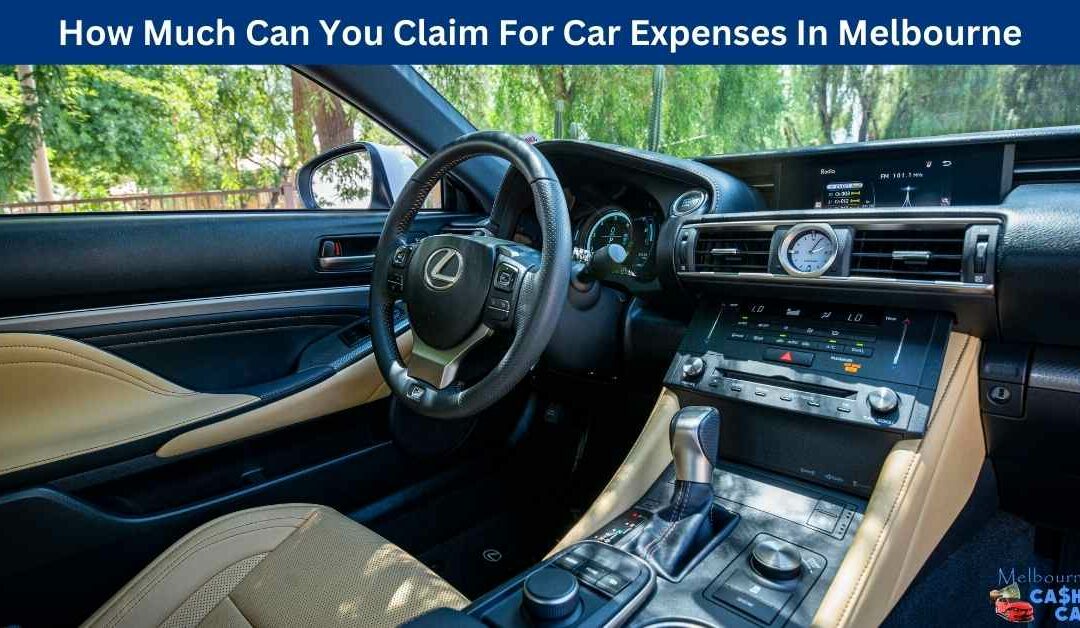Introduction
The cost of operating a vehicle can be greatly reduced by deducting automotive expenses from your taxable income. However, it’s crucial to comprehend which costs can be deducted and how to do it properly. We’ll talk about how much you may write off for automotive expenditures in Melbourne in this blog, as well as what you should know to get the most out of your deductions.
Explanation of tax deductions for automotive expenses
If you use your car to earn money, you can deduct those costs from your taxes. In other words, if you use your car for work-related activities, you can deduct a percentage of the costs from your taxes. The ratio of business use to overall use of the car determines the percentage of costs that can be claimed. You can deduct 50% of the costs on your tax return, for instance, if you use your car 50% for work and 50% for personal purposes.
Understanding car expense deductions in Melbourne is crucial
Making the most of your deductions when claiming automotive expenditures requires understanding the rules and regulations, which can be challenging. For reporting automotive expenses, the Australian Taxation Office (ATO) has precise standards that must be followed; failing to do so may result in penalties and fines. Additionally, the laws governing car expenditure deductions can differ from state to state, making it crucial to comprehend the local laws in Melbourne. You may make sure you’re deducting the most amount of money allowed and avoiding any penalties by being aware of the rules and regulations.
In conclusion, car expense tax deductions can be a terrific method to offset the costs of maintaining a vehicle, but it’s crucial to comprehend what expenses are allowable deductions, how to claim them correctly, and the particular laws that apply in Melbourne. More information on qualifying expenses, how to claim car expenses, unique concerns for employees, and a conclusion will be covered in the parts that follow.
Read : Do old cars need seat belts Australia
Eligible Costs
Not all expenses are created equal when it comes to deducting car expenses from your taxes. It’s critical to comprehend which costs can be deducted and how to accurately calculate them. The kinds of expenses that can be deducted and how to compute them are covered in this section.
Purchasing and maintaining a car.
Tax deductions are not available for car purchases. However, if they are incurred in the process of producing revenue, car operating expenses like fuel, oil, and tires are tax deductible. The ratio of the car’s overall use to business use determines the percentage of operating expenses that can be claimed.
Registration and insurance
If they are incurred while earning income, the cost of car insurance and registration is tax deductible. This covers CTP (compulsory third party) insurance, third party insurance, and comprehensive insurance.
Servicing and repairing
If an automobile repair or maintenance expense is made while earning income, it is tax deductible. This covers routine maintenance as well as any repairs required to maintain the vehicle safe and drivable.
Depreciation
Depreciation is the gradual loss of an asset’s value. Automobiles are categorized as depreciating assets, and the cost of depreciation can be written off as a tax deduction. To determine how much depreciation can be claimed, the ATO has established detailed standards.
Fuel prices
If you use fuel to make money, you can deduct the expense from your taxes. The amount of fuel expenses that can be claimed depends on how much of the car is used for business compared to how much it is used for personal purposes.
All automotive expenses, including receipts, invoices, and odometer readings, should be meticulously documented. This will make it simpler for you to determine the percentage of business use and will help guarantee that you are deducting the maximum amount of expenses permitted.
In conclusion, it’s critical to comprehend which costs might be deducted when claiming car expenses on your tax return. If they are incurred in the process of earning income, car purchase costs, operating costs, insurance, registration, maintenance and repairs, depreciation, and fuel costs are all tax deductible. The next parts will cover particular employee considerations, how to claim car expenses, and a summary.
How to Recover Car Costs
It might be challenging to deduct car expenses on your tax return, but with the right knowledge and careful record keeping, you can maximize your deductions. The actions you must take to properly claim automotive expenditures are covered in this section.
Keeping of Records
When claiming automotive expenses on your tax return, it’s essential to keep proper records. This includes documenting all expenditures with receipts, bills, and odometer readings. It’s crucial to keep track of each expense’s date, amount, and intended use as well as the car’s odometer reading at the time the expense was incurred. This will make it simpler to determine the percentage of business use and to present expense documentation in the event of an audit.
Calculating the percentage of business use
The ratio of business use to overall use of the car determines the percentage of costs that can be claimed. You must keep track of the total kilometers you drive for both personal and commercial purposes in order to determine the percentage of business use. The percentage of business use can then be calculated by dividing the total number of kilometers traveled by the total number of kilometers traveled for business.
Claims Submission Through Tax Returns
You can then deduct the appropriate percentage of expenses on your tax return after determining the percentage of business use. The costs must be listed on the tax return in the “other income” portion of the “income” section. Additionally, you should maintain all of your car spending records because the ATO might need them for an audit.
In conclusion, by maintaining accurate records, determining the proper amount of business use, and reporting claims through tax returns, you can deduct car expenses from your taxable income. It will be simpler for you to determine the percentage of business use and guarantee that you are deducting the maximum amount of expenses for your automobile if you keep complete records of all automotive expenses, including receipts, invoices, and odometer readings. We’ll cover unique concerns for employees, the conclusion, and further resources for more information in the parts that follow.
Read : Do Diesel Cars Have Catalytic Converters?
Employee Special Considerations
When reporting car costs on your tax return as an employee who uses their own vehicle for work-related activities, there are a few special things to keep in mind. Salary sacrifice and the fringe benefits tax (FBT) will be covered in this section.
Tax on Fringe Benefits (FBT)
The use of an automobile for work-related activities is one of the advantages covered by the fringe benefits tax (FBT), which companies must pay on behalf of their employees. You can be liable for FBT if your employer gives you a car for work-related use or pays for your automobile-related expenses. The FBT must be paid by your employer, who will normally include the expense in your compensation package.
Sacrificing Pay
Salary sacrifice is a contract where an employee gives up a portion of their pay in exchange for a non-cash advantage, such usage of a car. It’s crucial to realize that the car will be subject to FBT and that its worth will be added to your taxable income if you’re thinking about salary sacrificing for one. Furthermore, you won’t be able to deduct any further car expenses from your taxes.
In conclusion, workers who use their own vehicles for work-related activities must be conscious of salary sacrifice and the fringe benefits tax (FBT). You can be liable for FBT if your employer gives you a car or pays for your automobile-related expenses. Additionally, it’s crucial to be aware that the car will be subject to FBT and that its worth would be included in your taxable income if you’re thinking about salary sacrificing for one. To fully comprehend the implications of taxes and your own unique circumstances, it’s crucial to obtain professional guidance. We’ll cover the conclusion, the value of consulting a professional, and further resources for more information in the section that follows.
Conclusion
In order to maximize your deductions, it’s critical to comprehend the rules and regulations. Claiming car expenses on your tax return can be a wonderful method to offset the costs of maintaining a vehicle. What you need to know to maximize your deductions and how much you may write off for automotive expenditures in Melbourne were covered in this blog.
We’ve paid for acceptable charges including the price of buying and maintaining an automobile, insurance and registration, upkeep and repairs, depreciation, and fuel. We’ve also talked about how to write off car expenses, including keeping records, figuring out your percentage of business use, and filing claims on tax returns.
We’ve also covered unique factors for employees, like salary sacrifice and the fringe benefits tax (FBT). It’s crucial to comprehend how these guidelines relate to your own circumstance, and if you’re unsure, you should seek professional guidance.
In conclusion, deducting automotive expenses on your tax return can be a fantastic method to offset the cost of maintaining a vehicle, but in order to maximize your deductions, it’s crucial to understand the rules and restrictions. You can make sure you’re deducting the most by keeping precise records, figuring out the percentage of business use, and being aware of the unique rules for employees. To ensure compliance with the tax rules, it’s crucial to get professional guidance and to adhere to the ATO guidelines.
In-depth information about car expenditure deductions and other tax-related topics is also available on the ATO website and other online resources. To make sure you’re claiming the most deductions possible and avoiding any potential penalties, it’s always a good idea to stay up to date with the most recent facts and regulations.
If you want to get cash for your car in Melbourne, give us a call.
If you are in Clayton South, Victoria 3169, and looking for a car buyer near me or a car scrap yard, below is the best way to visit us.
Contact us at
Melbourne VIP Cash For Cars
Unit 3/2 Lace St
Eumemmerring VIC 3177
(03) 9067 7578

